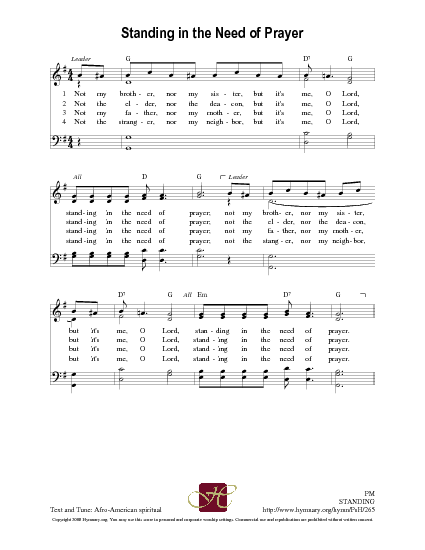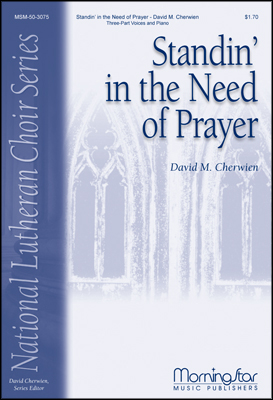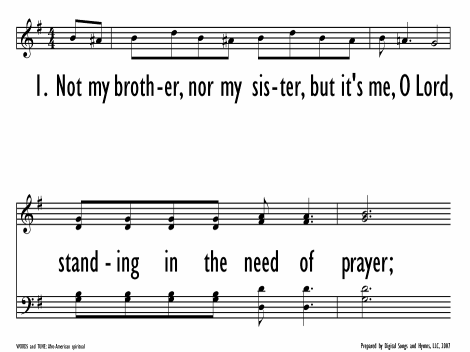- |
User Links
Standing in the Need of Prayer

Not my brother, nor my sister, but it's me, O Lord
Author: AnonymousTune: [Not my brother, nor my sister]
Prayer Songs
Published in 53 hymnals
Printable scores: PDF, MusicXMLAudio files: MIDI, Recording
Representative Text
1 Not my brother, nor my sister, but it’s me, O Lord,
standin' in the need of prayer;
not my brother, nor my sister, but it’s me, O Lord,
standin' in the need of prayer. [Refrain]
Refrain:
It’s me, it’s me, O Lord,
standin' in the need of prayer;
It’s me, it’s me, O Lord,
standin' in the need of prayer.
2 Not the preacher, nor the deacon, but it’s me, O Lord,
standin' in the need of prayer;
not the preacher, nor the deacon, but it’s me, O Lord,
standin' in the need of prayer. [Refrain]
3 Not my father, nor my mother, but it’s me, O Lord,
standin' in the need of prayer;
not my father, nor my mother, but it’s me, O Lord,
standin' in the need of prayer. [Refrain]
4 Not the stranger, nor my neighbor, but it’s me, O Lord,
standin' in the need of prayer.
not the stranger, nor my neighbor, but it’s me, O Lord,
standin' in the need of prayer. [Refrain]
Source: Our Great Redeemer's Praise #444
Author: Anonymous
In some hymnals, the editors noted that a hymn's author is unknown to them, and so this artificial "person" entry is used to reflect that fact. Obviously, the hymns attributed to "Author Unknown" "Unknown" or "Anonymous" could have been written by many people over a span of many centuries. Go to person page >Text Information
Related Texts
| First Line: | Not my brother, nor my sister, but it's me, O Lord |
| Title: | Standing in the Need of Prayer |
| Author: | Anonymous |
| Meter: | Irregular |
| Source: | African-American spiritual |
| Place of Origin: | United States |
| Language: | English |
| Refrain First Line: | It's me, it's me, it's me, O Lord |
| Copyright: | Public Domain |
| Liturgical Use: | Prayer Songs |
English
- African American Heritage Hymnal #441
- Anglican Hymns Old and New (Rev. and Enl.) #365
- Chalice Hymnal #579
- Church Hymnary (4th ed.) #493
- Community of Christ Sings #208
- Complete Anglican Hymns Old and New #838
- Fellowship Hymnal: with Worship Material and Services #253
- Gather Comprehensive #579
- Golden Bells: for Church, Sunday School and Evangelistic Services #110
- Golden Sheaves: a compilation of new songs suitable for the work and worship of the church #262 10 shown out of 48
Korean
Like 264, "Standing in the Need" is an African American spiritual, and, like many folk songs, its origin is unknown. Both text and tune became well known after their publication in The Book of American Negro Spirituals (1925), compiled by James Weldon Johnson and his brother,]. Rosamond Johnson.
Using hyperbole, or exaggerating to make a point, the text brings a very specific message: "I need prayer!" Obviously all the other persons mentioned in the text need prayer as well-yet the text stresses the individual's need for prayer. Such an under¬standing of this text permits its use in corporate worship-in which we all realize that each of us needs prayer just as much as all of us need prayer. The text emphasizes personal responsibility within a larger context of community.
Liturgical Use:
As a call to prayer, this song should be part of a time of sung and spoken and silent prayers-for forgiveness, of course, but also for healing, for gratitude, for more fervent faith, and so on.
--Psalter Hymnal Handbook, 1988
Notes
Like 264, "Standing in the Need" is an African American spiritual, and, like many folk songs, its origin is unknown. Both text and tune became well known after their publication in The Book of American Negro Spirituals (1925), compiled by James Weldon Johnson and his brother,]. Rosamond Johnson.
Using hyperbole, or exaggerating to make a point, the text brings a very specific message: "I need prayer!" Obviously all the other persons mentioned in the text need prayer as well-yet the text stresses the individual's need for prayer. Such an under¬standing of this text permits its use in corporate worship-in which we all realize that each of us needs prayer just as much as all of us need prayer. The text emphasizes personal responsibility within a larger context of community.
Liturgical Use:
As a call to prayer, this song should be part of a time of sung and spoken and silent prayers-for forgiveness, of course, but also for healing, for gratitude, for more fervent faith, and so on.
--Psalter Hymnal Handbook, 1988
Tune
[Not my brother, nor my sister]STANDING is a call-and-response tune; the Psalter Hymnal has marked clearly the solo lead parts and the congregational-response parts, which are to be sung in harmony. Since most African American spirituals were originally sung unaccompanied, have the choir or even the congregation hum the accompani…
Timeline
Arrangements
Media
Psalter Hymnal (Gray) #265
Small Church Music #1554
- PDF Score (PDF)
- MIDI file from The Cyber Hymnal #6313
- MIDI file from Psalter Hymnal (Gray) #265
- MIDI file from Psalter Hymnal (Gray) #265
- Audio recording from Small Church Music #1554
- Audio recording from Small Church Music #1554
- Audio recording from The United Methodist Hymnal #352
- MIDI file from With Heart and Voice: songs for all God's children #57
- MIDI file from With Heart and Voice: songs for all God's children #57


 My Starred Hymns
My Starred Hymns




